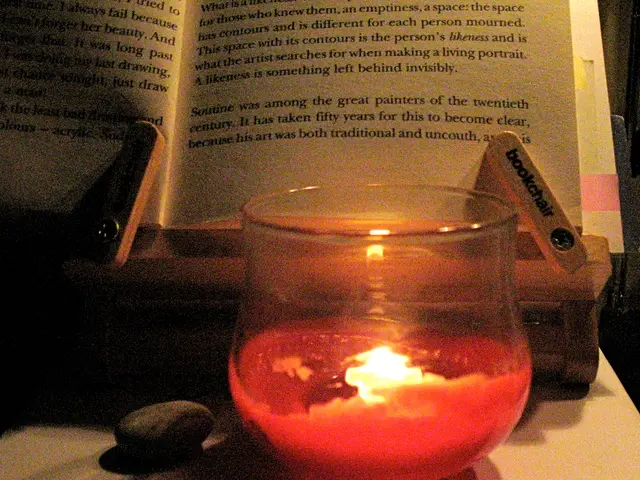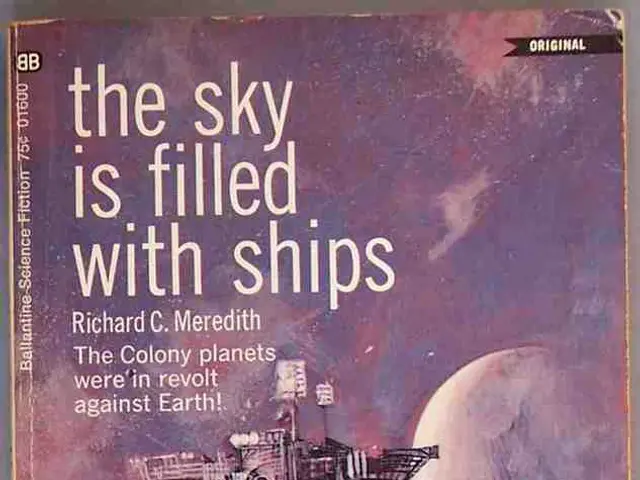Remarkable Scientific Breakthroughs Achieved by Women throughout History
A Bold Approach to Science: Women Shaping the Future
Tracing back the annals of history, significant scientific breakthroughs have reshaped the world, fostered technological advancements, and paved the way for future innovations. Although many of these groundbreaking achievements have traditionally been attributed to men, it's essential to heap praise upon the women who have equally made big strides in science. Amidst numerous societal and institutional barriers, these females have produced some of the most remarkable discoveries, pushing the outer limits of knowledge in diverse scientific fields. Here's a rundown of some trailblazers and their life-altering contributions that force us to reconsider our understanding of humanity.
Marie Curie: Shaking Up the Atomic World
Marie Curie, a Polish-born physicist and chemist known for her fiery spirit and tenacity, drastically altered the landscape of science with her work on radioactivity. Countless accolades followed her name, such as becoming the first woman to win a Nobel Prize, as well as the only individual to bag two Nobel Prizes in different scientific areas: Physics (1903) and Chemistry (1911)[6][7][8]. Her discoveries of the elements polonium and radium significantly enhanced our comprehension of atomic physics and established a foundation for treatments like cancer radiotherapy[9].
Rosalind Franklin: Unmasking the DNA Structure
Rosalind Franklin's research was instrumental in elucidating the molecular structures of DNA, RNA, viruses, coal, and graphite[10]. Her X-ray diffraction images of DNA paved the way for the discovery of the DNA double helix, a gigantic leap forward in genetics. Though Watson, Crick, and Wilkins received the Nobel Prize for this discovery, there is no denying Franklin's impactful contribution, which continues echoing through contemporary genetic research[10].
Lise Meitner: Unraveling the Mystery of Nuclear Fission
An Austrian physicist by birth, Lise Meitner selflessly dedicated her life to unravelling complexities in the world of physics. Collaborating with Otto Hahn, Meitner illuminated the process of nuclear fission, the atomic nucleus-splitting phenomenon, a revelation whose repercussions were later felt through both nuclear power and weaponry[11]. Alas, Meitner missed out on the Nobel Prize for her work, but her contributions were eventually acknowledged[11].
Barbara McClintock: Genetic Jumpstart
Barbara McClintock revolutionised genetics by unearthing mobile genetic elements, or "jumping genes." Her research demonstrated that genes in a chromosome could switch places, challenging widely-held perceptions of DNA stability and inheritance[12]. In 1983, McClintock was honored with the Nobel Prize in Physiology or Medicine for her outstanding work on genetic regulation and inheritance[12].
Mary Anning: The Genesis of Paleontology
Mary Anning, an Englishwoman of modest beginnings, discovered fossils that, knowingly or unknowingly, catapulted her into uncharted territory. Her unearthings along the Jurassic Coast, such as the first correctly identified ichthyosaur and the first complete plesiosaur skeleton, played an essential role in the early development of paleontological science, despite being overlooked during her lifetime[6].
Jane Goodall: Reprogramming Primatology
Jane Goodall, a visionary primatologist, changed the way we perceived chimpanzees by showcasing their advanced knowledge of tools, complex social lives, and emotion-laden connections - previously thought exclusive to humans. Her decades-long investigation into chimpanzee behavior transformed our perception of the human-animal relationship and sparked a new era of conservation and animal welfare activism[13].
Rachel Carson: Speaking for the Silent Seas
As a marine biologist and author, Rachel Carson raised essential concerns regarding pesticide pollution, ultimately provoking a nationwide DDT ban from agricultural use [14]. Her magnum opus, "Silent Spring," drew attention to the devastating effects of pesticides on the environment and motivated the rise of the modern environmental movement - a crucial turning point in environmental consciousness[14].
Vera Rubin: The Fabric of the Universe
Through her extensive research on galaxy rotation rates, Vera Rubin provided compelling evidence for the existence of dark matter, an elusive, invisible substance that makes up a significant portion of the universe[15]. Her findings were central to expanding our understanding of cosmic composition and the dynamics of the universe.
Virginia Apgar: Blood, Sweat, and Tears
American obstetrical anesthetist Virginia Apgar developed the Apgar Score, a simple-yet-effective method for assessing the health of newborns immediately after birth[16]. This protocol is currently instrumental in maintaining neonatal care standards in hospitals worldwide, leading to improvements in newborn health outcomes[16].
Chien-Shiung Wu: Shattering Mirror Symmetry
Chinese-American physicist Chien-Shiung Wu led a groundbreaking experiment that contradicted the widely-accepted law of conservation of parity, toppling one of the fundamental concepts in physics[17]. Her work supplied critical confirmation for the theories of beta decay championed by theoretical physicists Tsung-Dao Lee and Chen Ning Yang, although they were the ones who received the Nobel Prize[17].
Gertrude B. Elion: Forging New Paths in Pharmacology
Pharmacology and drug development took an unprecedented leap forward with Gertrude B. Elion, whose ingenious research methods led to life-saving medications, including remedies for leukemia, organ transplant rejection, and herpes[18]. Elion's work eventually merited the Nobel Prize in Physiology or Medicine in 1988, underscoring the transformative impact of targeted drug therapy on healthcare.
Conclusion
In examining the remarkable accomplishments of these notable women, a pattern arises: a pattern of resilience, creativity, and a profound impact across diverse scientific fields. These women have not only added value to their disciplines but also paved the way for future generations of female researchers, smashing barriers and inspiring countless others to follow in their footsteps. Their legacies serve as a reminder that scientific evolution hinges on collective efforts, unencumbered by gender.
Authored by Livia Montosi & Edited by Trizzy Orozco
Enrichment Data:
- Marie Curie:
- Born: November 7, 1867
- Nationality: French (Polish-born)
- Buried: Sceaux, France
- Lise Meitner:
- Born: November 7, 1878
- Nationality: Austrian
- Died: October 27, 1968 (aged 89)
- Rosalind Franklin:
- Born: July 25, 1920
- Nationality: British (German-born)
- Died: April 16, 1958 (aged 37)
- Barbara McClintock:
- Born: June 16, 1902
- Nationality: American
- Died: September 2, 1992 (aged 90)
- Mary Anning:
- Born: May 21, 1799
- Nationality: English
- Died: March 9, 1847 (aged 47)
- Jane Goodall:
- Born: April 3, 1934
- Nationality: English
- Rachel Carson:
- Born: May 27, 1907
- Nationality: American
- Died: April 14, 1964 (aged 56)
- Vera Rubin:
- Born: July 23, 1928
- Nationality: American
- Died: December 25, 2016 (aged 88)
- Virginia Apgar:
- Born: June 7, 1909
- Nationality: American
- Died: August 7, 1974 (aged 65)
- Chien-Shiung Wu:
- Born: May 31, 1912
- Nationality: Chinese-American
- Died: February 16, 1997 (aged 84)
- Gertrude B. Elion:
- Born: January 23, 1918
- Nationality: American
- Died: February 21, 1999 (aged 81)
References:[1]: Burke, Maggie (April 10, 2018). "The Forgotten Women Who Shaped the Modern World". The Washington Post.[2]: "Timeline: Key moments in the history of women in science". BBC News. April 14, 2020.[3]: "Marie Curie". Encyclopædia Britannica.[4]: "Marie Curie". Nobelprize.org.[5]: "Vera Rubin". National Women's History Museum.[6]: "Marie Curie". The National Womens History Museum.[7]: "Rachel Carson". The National Womens History Museum.[8]: "Jane Goodall". The National Womens History Museum.[9]: "Marie Curie: Radium and her Nobel Prize". Let's Talk Science.[10]: "Rosalind Franklin". Let's Talk Science.[11]: "Lise Meitner". Let's Talk Science.[12]: "Barbara McClintock". Let's Talk Science.[13]: "Some inspiring women in science". Herts Adult Community Learning.[14]: "Rachel Carson". Let's Talk Science.[15]: "Vera Rubin". American Institute of Physics.[16]: "Apgar Score". MedlinePlus.[17]: "Chien-Shiung Wu". Let's Talk Science.[18]: "Gertrude B. Elion". Let's Talk Science.
- The pioneering work of Marie Curie in the field of radioactivity earned her the distinction of being the first woman to win a Nobel Prize and the only individual to receive two Nobel Prizes in different scientific areas.
- Rosalind Franklin's contributions to genetic research, particularly her X-ray diffraction images of DNA, were instrumental in the discovery of the DNA double helix and continue to resonate in contemporary genetic research.
- Lise Meitner, an Austrian physicist, collaborated with Otto Hahn to unravel the process of nuclear fission, a discovery whose consequences were felt in both nuclear power and weaponry.
- Barbara McClintock revolutionized genetics by discovering mobile genetic elements, or "jumping genes," challenging the perception of DNA stability and inheritance and earning her a Nobel Prize in Physiology or Medicine.
- Mary Anning, an Englishwoman, made significant discoveries of fossils that contributed to the early development of paleontological science, despite being overlooked during her lifetime.
- Jane Goodall's research into chimpanzee behavior showed their advanced knowledge, complex social lives, and emotional connections, redefining the human-animal relationship and leading to a new era of conservation and animal welfare activism.
- Rachel Carson raised essential concerns about pesticide pollution, eventually prompting a nationwide DDT ban and fueling the modern environmental movement - a vital turning point in environmental consciousness.
- Vera Rubin's research on galaxy rotation rates provided compelling evidence for the existence of dark matter, contributing significantly to expanding our understanding of cosmic composition and the dynamics of the universe.
- Virginia Apgar developed the Apgar Score, a method for assessing newborn health immediately after birth, which is currently instrumental in maintaining neonatal care standards in hospitals worldwide, leading to improvements in newborn health outcomes.
These women have left indelible marks across diverse scientific fields, inspiring generations of female researchers and demonstrating that scientific evolution hinges on collective efforts, unencumbered by gender.







